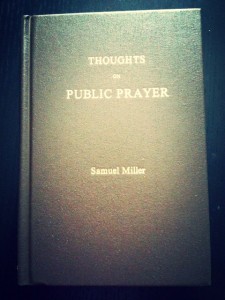 I didn’t grow up in churches where the pastor engaged in extended public prayer during the week’s worship gathering.
I didn’t grow up in churches where the pastor engaged in extended public prayer during the week’s worship gathering.
Most churches I have been a part of (as a member or pastor) treated prayer mostly as a transitional element, a way to move somewhat seamlessly from song to sermon and then back to song. Over the years I’ve had peculiar interest in studying what the Bible says about corporate worship and what history reveals about the church’s worship. It didn’t take very long to see the Bible and church history unveil a prominent place to public prayer. Yet, I still really didn’t know of any churches that had a distinct time in their weekly worship for a pastoral prayer . . . then I went to Capitol Hill Baptist Church.1 Their service had lots of public prayer; lots of long public prayer.2 It was a joy to experience!
As a result of these studies and experiences, we planted Imago Dei Church with a hope that God would mold us into a praying church. A reflection of that desire is seen in our weekly liturgy as we have set times for both public and private prayer. In the middle of our service I get up and offer a pastoral prayer – mostly a prayer of intercession – for six to seven minutes. I think it might be the most daunting thing I do each week, thus I am always looking for ways to grow in this area.
Enter Samuel Miller’s Thoughts on Public Prayer. I finished the book this week and Miller’s work ends with a thunderous chapter entitled, “The Best Means of Attaining Excellence in Public Prayer.” He organizes his thoughts under five primary means leading to excellence in public prayer. I needed to read them and maybe they will be of profit to you as well.
SAMUEL MILLER’S FIVE MEANS TO EXCELLENCE IN PUBLIC PRAYER
- None can hope to attain excellence in the grace and gift of prayer in the public assembly, unless they abound in closet devotion, and in holy communion with God in secret.
- Not only read, but study some of the best books which have treated the subject.
- Store your mind with the language and riches of the word of God.
- When any dispensation of Providence occurs,3 which appears to demand special attention in the devotions of the sanctuary, to make prompt and special preparation for presenting that object in public prayer in the most simple, scriptural, and edifying form.
- Cultivate the habit of devotional composition; i.e. consider writing out your prayer.
Eventually I hope to post choice excerpts from Means #1 as Miller’s thoughts on the subject are invaluable, but in posting this I am freshly reminded of my need to spend time in the closet. Off I go.
—————————————————————————————————————————————
- I’ve since come across many more churches that have extended times of public prayer. ↩
- Mark Dever, pastor at CHBC, was once asked about the church’s practice of corporate prayer and he said: “At Capitol Hill Baptist we will always have a prayer of praise (which is focused on some aspect of God), a prayer of confession (where we confess our sins), a prayer of intercession/pastoral prayer (where we pray through various concerns that we have as a church family), and a brief prayer of thanks. There will also be a prayer after the sermon in which we try to pray certain truths into our hearts; and there will sometimes be a brief prayer of invitation for God’s presence at the beginning of our service.” ↩
- This would any unusual event in the life of the church, country, or world. ↩
